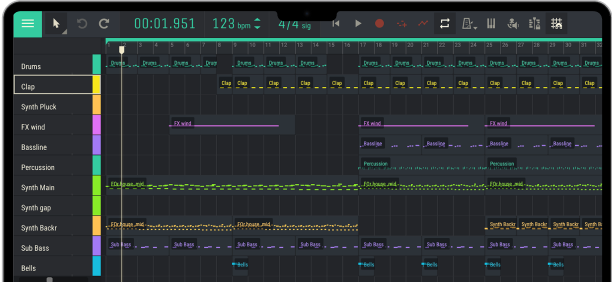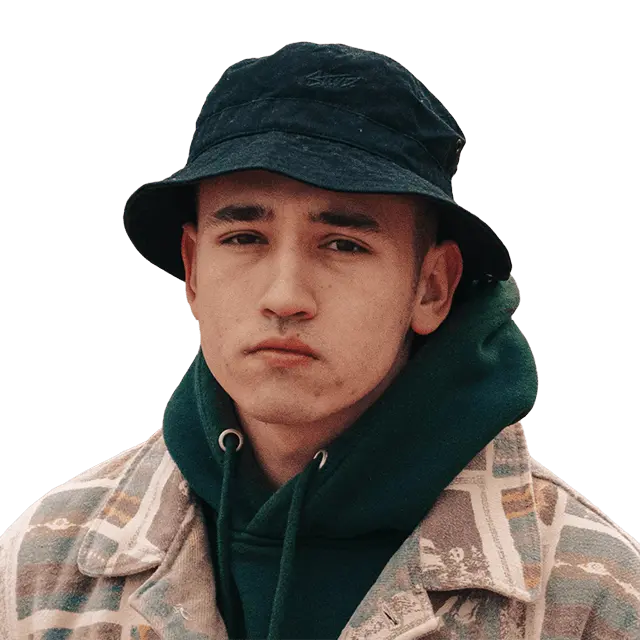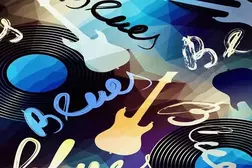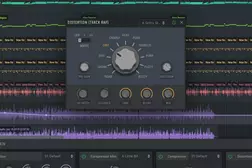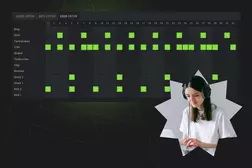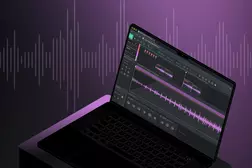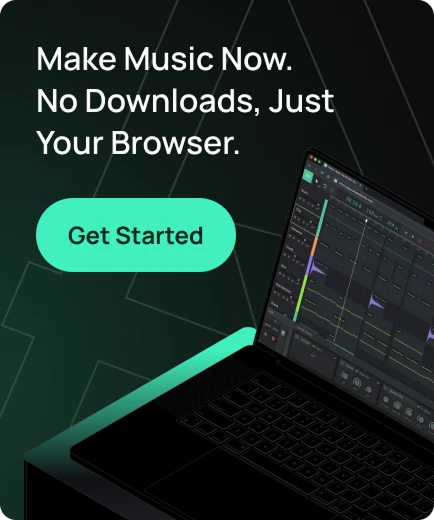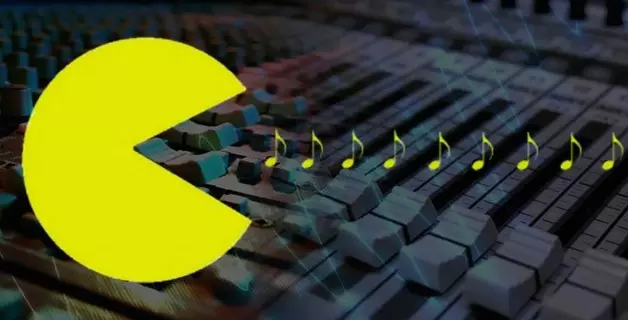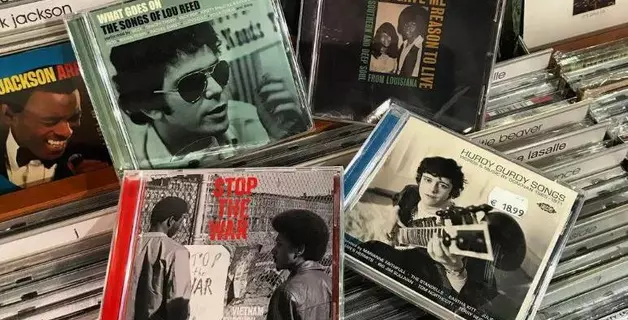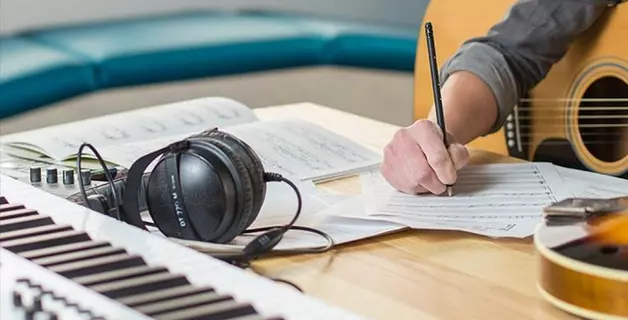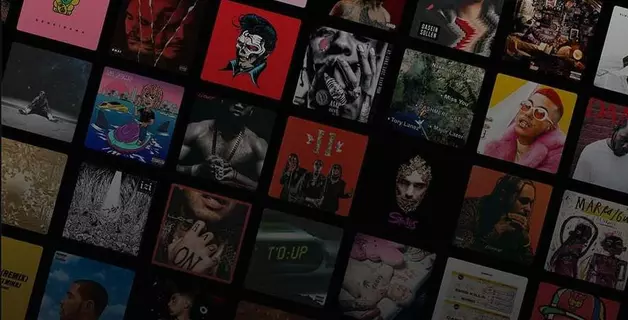How Music Licensing Works — And Why It Matters for Creators
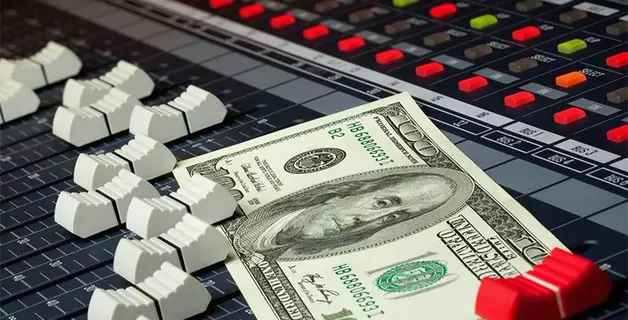
Music licensing is the act of allowing the use of copyrighted musical works. The purpose of music licensing is to ensure that musical authors are compensated for the various uses of their creations. The acquirer has limited rights to use the work without concluding a separate agreement.
Amped Studio empowers you to create your own professional music compositions targeting specific audiences who can use your product, both for personal use and for commercial purposes. In order for the musical work you create to bring you profit, we recommend that you familiarize yourself with the principles of music licensing to understand how the process itself works.
Understanding Music Licensing
Every time you create a song or tune, you create a set of rights. This fresh composition, your unique creation, becomes your intellectual property.
Music licensing is a legal process in which you grant permission to use those rights. You allow others to use your music in a variety of formats: be it on radio broadcasts, television shows, YouTube videos, commercials, movies, or even in your local coffee shop.
Music licensing matters because it can generate income from your work. A licensee, such as a director who needs your music for his film, pays you a fee (often called a “royalty”) for using your work.
This allows them to legally use your music, while you receive royalties for its usage Music licensing is not just a matter of money, but also of control. You determine who will use your music and how. This will help maintain the integrity of your creativity and brand as a music producer.
The Role of Music Licensing in the Music Industry
Let’s dive into the music industry and record labels for a minute. This is where music licensing doesn’t just play a peripheral role – it’s central to the business.
This is how musicians make money, other than selling albums or streaming on Spotify. Take copyrighted music for example…the copyright owner has exclusive rights to their music.
If a company wants to use a copyrighted song in an ad, it can’t just take it; they need to get a music license. The same goes for radio stations, TV shows, movies, and even YouTube videos.
By understanding and using music licensing, you open up new income opportunities. This is why, as a music producer, understanding music licensing is of utmost importance.
Music licensing not only clarifies your rights but also opens potential revenue streams. It’s about seeing where your music can go and how you can profit from it.
How Does Music Licensing Affect You?
What does all this mean for you as a digital music producer? Actually, it means a lot. Music licensing lets you earn income from your compositions beyond album sales or live performances. Let’s look at synchronization licenses, for example. These licenses allow your music to “sync” with visual materials such as movies or video games. Imagine hearing your unique beats on the big screen or while playing your favorite video game. That’s what synchronous licensing can do. With the right license, your music can be used in various media — and you receive royalties each time it’s played.
Another example is music broadcast on the radio. Every time your music is played on radio or television, it earns you royalties. To ensure you receive these fees, you should work with advocacy organizations that collect these fees on your behalf.
Finally, let’s think about the scope of licensing. Your music can be played anywhere from your local coffee shop to a Hollywood blockbuster. Each of these opportunities is your chance to make money, a moment for your creativity to shine, and a step forward in your journey in the world of digital music. This is an opportunity that you should definitely take advantage of.
Definitions
When discussing music licensing, the following terms and definitions often come up:
A license is a right granted by the copyright owner or his/her agent to broadcast, reproduce, or perform a copyrighted work. There are different types of licensing agreements, including a fixed fee for a specified period of use or royalty payments based on the number of copies of the work sold or the total revenue generated from its distribution. In addition to the basic payments, many music licensing agreements provide additional payments to the copyright owner when the work in which it is included (such as a film or play) achieves financial success above a certain threshold.
The licensor is the owner of the licensed work who grants the right to use it.
Licensee – an individual or legal entity who is granted a license to use the work.
Performance is the public performance of a piece of music, whether live or recorded, in an original performance or adapted by another performer. Playing a music CD (or cassette tape, etc.) in a public place is also considered a “performance” of the work.
Broadcasting is the playing of live or recorded works to audiences in various venues such as bars or bookstores, including radio, television, web casting, podcasting and other forms of transmission.
Copyright organizations are large companies that own the rights to perform copyrighted musical works. Prominent among them are organizations such as the American Society of Composers, Authors and Publishers (ASCAP), Broadcast Music Incorporated (BMI), the Society of European Authors and Composers (SESAC) and La Asociación de Compositores y Editores de Música Latinoamericana (ACEMLA) for Latin American music. In the UK, PRS for Music and Phonographic Performance Limited license recordings and music videos. These companies license public performances of music on a non-exclusive basis, using complex formulas to distribute royalties among copyright holders. The license may be complete, but certain aspects may be subject to negotiation.
Rights organizations review radio and television broadcasts, offer general licenses to broadcasters, and investigate complaints of unauthorized speech. In the US, ASCAP and BMI send field agents to monitor public performances. Field agents can act on behalf of an organization when negotiating fees for a general license, but individuals can also negotiate directly. The fee may be presented on a take-it-or-leave-it basis, but if there is a dispute, the amount may be appealed to the Federal District Court for the Southern District of New York.
Pre-cleared music is music that has been subject to a prior agreement allowing distribution and lawful use under certain circumstances. This license can be used in film, video, television (commercials and programs), the Internet, live events, video games and multimedia productions.
Copyright is literally the “right to copy.” The copyright holder has five exclusive rights, including reproduction, preparation of derivative works, distribution, public performance, and display of the work. Until 1886, there was no effective international copyright law, but the Berne Convention for the Protection of Literary and Artistic Works, created in 1886, was the first major international agreement on the subject.
Royalty-free music means that the copyright owner has either waived the collection of royalties or waived the right to additional royalties in exchange for an upfront payment.
Sync licensing is the process of licensing musical works accompanying moving images in movies, television programs, videos and DVDs.
Principal use licensing involves licensing a recording of a musical work for use as a soundtrack, title card, intro or background to a motion picture.
The publisher, from a copyright perspective, is the owner of the protected work. Today, even the most famous songwriters often form publishing companies to own the rights to their work. The term “publisher” is a carryover from the past when music distribution was done on paper in the form of sheet music or pianos.
Everything You Need to Know about Music Rights and Licensing Agreements
Getting into the groove of the music industry is like tuning into a new tune or recording. It may seem complicated at first, but once you start to understand all the intricacies, everything falls into place. So let’s dive into the world of rights and licensing in the music industry and start creating harmony.
A Closer Look at Copyrighted Music
When you release a recording into the music world, you have a copyrighted creation in your hands. The melody that just emerged becomes your original work and automatically gains protection under copyright law.
Now you become the owner, what does that mean? You have the exclusive right to control who may reproduce, distribute, perform or display your work.
Illegal use may result in copyright infringement, which is a serious violation of the law and may result in serious consequences.
So your copyrighted music isn’t just a professional creation; it is a valuable asset.
Licensing your copyrighted music allows others to legally use it while maintaining your rights.
Essentially, you are renting out your music. If someone wants to use it in a café, radio station or movie, they will have to get a license from you, the copyright owner.
The Challenges of Music Rights Organizations
Music rights organizations, also known as performing rights associations, play an important role in music licensing. They make sure that you, as a music producer, get paid to play your music publicly – be it in a shopping mall, on the radio or on a TV show.
Participation in such an organization can save you a lot of hassle. They track where and when your music is performed publicly, collect royalties from those performances, and remit them to you.
Their task is to ensure that your work does not go unnoticed and, most importantly, is properly rewarded. Examples of such organizations include ASCAP (American Society of Composers, Authors and Publishers), BMI (Broadcast Music, Inc.), and SESAC (Society of European Authors and Composers).
Joining one of them can be a smart move for a music producer. They have the experience, connections, and systems to help ensure you get the payout you deserve.
Decoding the different types of music licenses
In the world of music licensing, there is no one size fits all approach.
Different uses of your music require different types of licenses.
Understanding these types can ensure that you are compensated fairly and that your music is used properly.
1. License synchronization
First of all, this is a synchronization license. When you’re trying to stream music or license music, a sync license allows you to “sync” your music with visual media.
So, if a director wants to use your music in their film, they will need a sync license from you.
The same goes for TV shows, video games, and even YouTube videos.
And remember: every time your music is played, you get paid.
2. Basic licenses
Next comes the main license… and this one is a little different.
The Master License gives permission to use a specific recorded track of your music.
This means that they are using not just your song, but your version of it, your master recording.
Let’s say a TV show wants to use your actual footage in an episode…they’ll need a master license from you first.
3. Public performance licenses
We also have licenses for public speaking. These licenses give the right to play music in public places.
Whether it’s a coffee shop playing your song or a DJ spinning your tune at a local nightclub, they’ll need a public performance license from you.
The beauty of this is that these licenses can result in ongoing royalties since each play is paid for.
It should be noted that a public performance license does not allow the licensee to reproduce or distribute your music, which would require an entirely separate license.
To protect your music and your rights, it is important to understand the scope and limitations of each license type.
4. Broadcasting licenses
Broadcast licenses are another type of music license.
This includes playing your music on broadcast channels such as radio and television.
The more your music is listened to, the more you earn.
It is not unusual for a popular song to generate significant revenue from broadcast licenses alone.
5. General licenses
This is a type of license that gives the licensee the right to play or download any song from the music rights organization’s repertoire for a set fee.
It’s like a buffet, but with music.
This is great for organizations such as radio stations or television networks that broadcast a lot of music and need a cost-effective and convenient licensing solution.
It’s a win-win situation for both parties.
For a music producer, a full license can provide a steady income over a period of time.
For the licensee, this simplifies the licensing process because they do not have to obtain separate licenses for each song they want to use.
However, the terms of a full license can vary greatly.
It is extremely important to read the fine print and understand exactly what rights are granted before entering into a full license agreement.
6. Mechanical licenses
Mechanical licenses provide permission to reproduce and distribute copyrighted musical compositions (songs) on:
- CDs;
- Records;
- Tapes;
- Tapes;
- Permanent digital downloads;
- Interactive streams;
- Other digital configurations.
If you record and distribute cover songs, a mechanical license is required.
7. Theater licenses
Theater licenses, also known as “grand rights”, are required when a musical work is used in a dramatic performance such as a musical, opera, play or ballet.
Theatrical license is necessary when music contributes to the storyline or character development.
8. Print licenses
Print licenses come into play when someone wants to reproduce and distribute the sheet music for a song.
This can be anything from a full orchestral score to a simple guitar tablature.
If your song becomes popular and there is a demand for sheet music, a printing license ensures that you get a share of the sales.
Maximizing Profits: Effective Music Licensing Strategies
By developing musical creativity, you also strive to maximize your profits. This is extremely important, because your creativity should bring you not only satisfaction, but also material benefits. Let’s look at some effective music licensing strategies that can help you achieve this goal.
Royalty-free Music
Royalty-free music offers the user a one-time payment for unlimited use. This approach provides flexibility and appeal to those who prefer ease of payments.
Offering free music provides an easy, convenient, and cost-effective way to consume music, especially for those involved in multiple projects or need to access music content frequently. This makes your music more attractive to buyers, which increases sales.
Additionally, royalty-free music can provide a stable and predictable income stream because buyers pay for it up front, allowing you to get your money instantly without waiting for royalties. This is especially valuable if you are just starting to engage in musical creativity and need quick results from your work.
Additionally, making parts of your music catalog freely available royalty-free can reach a wider audience and encourage more sales.
Effective Use of Stock Music Platforms
Standard music platforms such as AudioJungle or PremiumBeat are an important resource for music producers, providing the ability to sell licenses to their music. By providing access to a global audience, these platforms help increase the visibility and sales potential of your work.
One of the key advantages of stock music platforms is their extensive categorization and search functionality. When you upload your compositions, you can tag them with relevant keywords, making the search process much easier for potential buyers.
However, it is important to remember that most stock platforms offer a flat fee for each license sold, rather than regular royalties. Therefore, before you start selling your music, you should carefully review and understand the licensing terms of your specific platform.
Despite this, the quality of your music remains a key success factor. Your tracks must be professionally created, unique and capable of attracting a wide range of potential buyers.
Essential Use License: Protecting Your Rights
A master use license grants the licensee the right to use a specific recording of a song in various visual media projects, such as films, television shows, or commercials. It’s important to note that this is different from a sync license, which covers the rights to the underlying composition. This right is usually granted by the record label or the copyright holder of the master recording.
Your own music may be subject to a Master Use License if you are a music producer who created, mixed and released that music yourself. This can be quite lucrative, especially if your music is used in large media projects. However, it is essential to carefully review the license terms to ensure they are fair and protect your interests.
Journey to Music Licensing Mastery
Opening up to the world of music licensing is not an easy process. It is more like an exciting journey, full of interesting discoveries and opportunities. There are critical milestones along the way, and knowing what’s ahead can give you an edge.
So how do you master the art of music licensing? It all starts with a few key steps. First, you’ll need to find a reputable music publisher to help you promote your work and manage licensing agreements. Next, it’s important to understand the intricacies of music rights organizations and how they impact your process.
Finally, negotiating the perfect music licensing agreement is key. This agreement must be balanced and beneficial to all parties to ensure that you are protected and fairly compensated for your work.
In this section, we’ll take a closer look at each of these steps, providing you with inside information and practical tips to help you on your path to music licensing mastery. After all, success in this field depends on smart actions and well-thought-out strategies, and I am here to help you with that.
Collaboration with a suitable music publisher
Music publishers play a key role in the world of the music industry and are powerful allies. They take on a wide range of responsibilities, including negotiating licenses, collecting royalties, and promoting your music. In return, publishers receive a portion of your income, but if they do their job well, they increase your earnings enough to make up for their share.
Choosing the right music publisher can make a huge difference to your music career. He should have the right connections in the industry, understand your creativity, and know how to place your music for maximum profit. The right publisher stays up to date with changes in the music industry and provides you with relevant advice.
Research plays a key role in choosing the right publisher. Review the publisher’s track record, ask for feedback, and consult with colleagues who have worked with them. Find a publisher that aligns with your goals and vision as a music producer. Remember that a good music publisher will not only manage your music licenses, but will also be an active partner in your career.
Register with the appropriate music rights organization
Music rights organizations (MROs) play an important role in the music licensing process. They protect your rights as a music producer, ensuring that you receive fair compensation for the public performance or reproduction of your music. Different MROs serve different rights and regions, so it’s important to choose one that suits your music and your target audience.
For example, if your music is intended for radio broadcasting, then you need an MRO that has a strong presence in that area. Registering with MRO includes providing information about your music, including copyright information and rights you own. MRO then uses the data provided to collect royalties on your behalf.
This is an important step to ensure that you receive compensation for the use of your music. Therefore, it is necessary to carefully select the appropriate organization and regularly update information about your musical work to ensure effective royalty collection.
Negotiating a License Agreement: The Art of Reaching an Agreement
Negotiating a music licensing agreement is often a complex process that feels like navigating a maze. There are many parties involved, each of which is interested in achieving its own goals. The terms may be confusing, but that shouldn’t scare you.
With a little knowledge and preparation, you can successfully complete this process by entering into a license agreement that is fair and beneficial to you. It is important to understand your needs and goals, be willing to compromise, and negotiate with confidence.
Understanding the Different Types of Licenses
First, it’s important to understand what each license type is. For example, a master license gives the licensee the right to use a specific recorded version of a specific song. While a sync license allows you to combine your music with visual media such as movies or commercials.
Setting Expectations
It is important to clearly articulate what you expect from the agreement. This may include the scope of the license, the level of royalties and the duration of the contract. Feel free to negotiate these terms, remembering that you always have control over your music and should not settle for anything less favorable.
Help from professionals
It is always recommended to have an entertainment lawyer review the agreement before signing it. They can identify potential problems and make sure the agreement is in your best interests. The ideal music licensing agreement not only distributes your music, but also protects your rights and ensures fair compensation.
Song Rights
Music plays an important role in creating atmosphere and emotional depth in content across platforms ranging from advertising to films and videos. It helps to establish contact with the audience, evoke the right emotions and make the content memorable. Musical compositions are widely used in various fields, including advertising, television broadcasts, presentations, vlogs and even social media.
Using appropriate music in an advertisement or film can greatly enhance the effectiveness of the message and persuade the audience to take a desired action, such as purchasing a product or service. The right choice of music can also transform ordinary content into a work of art, adding aesthetic value and appeal to viewers.
Content creators often use music to improve the quality of their work and attract a larger audience. For example, including popular songs on TikTok or live streams can attract many new followers and make the content go viral. It is important to choose music that matches the content and target audience to achieve the best effect.
By using the right music in your content, you can greatly improve its effectiveness and appeal to your audience. For example, including a suitable song in an advertisement can help convince the target audience to purchase your product or service. Also, a musical arrangement can make your film more attractive and memorable, turning it into a real masterpiece.
Transition songs can add dynamism and emotional depth to your podcast. Additionally, using an interesting composition in the background during live broadcasts can attract the attention of new subscribers to your channel. Your TikToks can also go viral by using popular songs, which will help increase their reach and attract new audiences.
Despite all the benefits of using music in your content, it is worth keeping in mind the rules and regulations set by social platforms. Many of them prohibit the use of copyrighted materials without the appropriate licenses. The algorithms of these platforms can detect inconsistent use of music and result in notifications or even suspension of the content creator’s account. Therefore, it is important to choose music that is licensed or available for use without copyright restrictions.
Due to copyright restrictions, many professional content creators opt for copyright-free music or purchase licenses for songs they want to use in their videos. This allows them to avoid copyright infringement issues and keep their social media channels and accounts safe.
If you’re looking to outshine your competitors and create memorable content based on amazing music, we recommend checking out our library of free, copyright-free music for YouTube. We also provide a detailed guide on how to purchase song rights so that you can use quality music in your projects without any copyright issues.
How to Buy Rights to Songs?
Understanding music licensing and copyright protection can be challenging for those who are not professionals in the field. However, we are here to clarify both of these concepts and tell you how you can get the rights to use a song.
Let’s start with what a music license is. In simple terms, a music license is a legal document that grants the media the right to commercially use a song subject to certain pre-agreed conditions. Such documentation clearly states the validity period of the license and the cost of the right to commercial use of this musical work. Additionally, the licensing documentation details what you can and cannot do with the song.
Based on the details above, there are several types of music licenses, the most common of which include:
Master license
A master license, also known as a master license, represents the rights to use the original recording of a song and is often called a master rights or master lease. If you need to use an existing recording of a song, you will need master rights. No matter how long you want to use (from a few seconds to a full composition), you need to get master rights. After paying for the master rights to a song, you can use any part of it in your video: the full song, the guitar part, the karaoke version, and so on. You will also need to pay for a master license to use the song recording in a mashup, on stage, for retail, interpolation, advertising, TV shows, films, and so on.
Synchronization license
Also known as a sync license or sync rights, a sync license gives the license holder the right to use a song included in a video format, such as a DVD or YouTube video. Obtaining a synchronization license is necessary to use a copyrighted song in commercials, advertisements, films, television series and other video formats.
A public performance license is one of the most common music licenses requested these days. This license refers to the rights to “perform” the music. Once you have a public performance license for a song, you can perform it online, at concerts, on the radio, on TV, in front of an audience, etc. Without a public performance license, you may not perform the song publicly (e.g., at venues, on radio, or other public broadcasts).
Mechanical license
A mechanical license, also known as mechanical rights, is intended to provide protection for physical reproductions of music, such as compact discs, vinyl records, cassettes, and other tangible forms of distribution of audio recordings. The owner of a mechanical license for a musical work, often the artist himself, enters into an agreement with publishers, distributors and record labels to release and sell physical copies of his work. Under the terms of this agreement, the owner of the mechanical rights receives royalties for each copy produced.
If you plan to publish and distribute a song on physical media, you will need to obtain the mechanical rights to it. You will also need mechanical rights if you are going to record a cover version of a song or use samples of it. Any derivative work that modifies the original recording requires mechanical rights.
Theater license
If you plan to perform a copyrighted song on stage, you will have to obtain a theatrical license, also called theatrical rights.
Features of obtaining a license
Depending on your plans to use the copyrighted song, you will need to obtain the appropriate license. Without proper permission from the copyright owner, there may be serious consequences if you use such songs in your videos, commercials, plays, films, TV shows, podcasts, live broadcasts, etc.
Copyright is strictly protected worldwide. Major social media platforms use advanced algorithms to detect illegal use of copyrighted songs. If such use is detected, the copyright owner and the social platform on which you posted the content may send you a warning. At best, you will be asked to remove the content. However, there is a risk of being banned from the platform, losing your channel, or even facing lawsuits. Therefore, many content creators choose to use free music tracks or purchase the rights to the songs.
If you want to acquire the legal rights to a specific song, there are a few steps you need to follow:
- First of all, determine who is the copyright owner of the song you want to use. Next, you need to find that owner’s contact information. You can check record label websites or artist personal pages to find an email address or phone number. Performing rights societies such as ASCAP, SESAC or BMI can also help put you in contact with the right people. Another option is to turn to companies that specialize in music licensing;
- Once you have the necessary contact information, you should submit your song rights request via email or in writing. You need to introduce yourself, explain for what purposes and where you plan to use the song, and also indicate what type of license you need;
- The next step is to make the payment. After depositing the required amount, you will receive an official document confirming the purchase of a license to use this song. You can then use the song for personal and commercial purposes without fear of possible legal consequences.
If you don’t want to deal with the hassle of copyrighting a song, you can always use the non-copyrighted songs available here on Snapmuse. Visit our YouTube background music library to find high-quality tracks that will add extra interest to your videos.
AI‑Generated Music & Copyright — What’s Protected, What Isn’t
As of early 2025, the U.S. Copyright Office clarified its stance on works generated or assisted by artificial intelligence (AI). Under its updated guidance, purely AI‑generated music — that is, output created entirely by a machine without meaningful human creative input — generally cannot be granted copyright protection.
However, if a human creator contributes significant expressive authorship — for example by writing melodies or lyrics, arranging or editing AI output, or otherwise shaping the music in a way that reflects their personal creative decisions — then that work may qualify for copyright.
What this means for licensing: only music that qualifies for copyright can legally be licensed. So if you base a composition entirely on AI output without substantial human input, you may not own the rights to license it. On the other hand — with enough human authorship — you retain copyright and thus retain the ability to license the work, control its use, and monetize it.
Determining the Cost of Rights to Use a Song
There are many factors that influence the cost of rights to use a song, and there is no one fixed amount that would be universal in all cases. The price can vary depending on many factors, such as the song itself, the popularity of the artist and his record label. Rights to use a song can pay modest sums, such as less than $100, to significant sums, reaching thousands of dollars.
In addition, some forms of music licensing may require you to share your earnings with the artist of the original song. This may mean that a portion of your profits will be sent as royalties to the copyright holder.
The best way to find out the exact terms and costs of song rights is to contact the song’s copyright holders directly. You can find their contact details on the official websites of record labels or artists. If you are having trouble, you can always seek help from a professional licensing service that can provide support and advice during the process of acquiring the rights to use a song.
Usage Rights after Purchase
Yes, when you purchase a song you get the rights to use it. However, you must read the terms and conditions carefully as each music license provides different rights. For example, if you purchase a theatrical license, you can perform the song on stage, but this does not give you the right to make physical copies (such as CDs or vinyl records).
Broadcasting
In the context of music licensing, radio broadcasting is the reproduction of recorded or live music to an audience outside the normal social environment. Bookstores, bars and live music venues are often the targets of lawsuits for broadcasting music without first obtaining a performing license.
Music streaming in grocery stores and elevators is a service that is purchased from various organizations that offer it, of which Muzak is the largest. A portion of the fees paid for this service is used to pay licensing fees. Except in the very narrow circumstances described in the “small business exception” section of 17 USC 110, businesses, restaurants or stores that broadcast radio broadcasts or display television programs on their premises are not required to pay license fees.
Radio stations pay licensing authorities fees for non-exclusive rights to broadcast music. These fees are typically charged annually as part of a blanket license, which can vary depending on audience size, advertising revenue, and volume of music usage. As part of the licensing agreement, radio stations may undergo periodic tests of the music they play, the results of which are reported to the licensing department.
Broadcasting of pre-recorded music at live events in retail outlets larger than retail or restaurant scale, such as stadiums, arenas, or parks, is subject to U.S. copyright law using a “blanket license.” These licenses are obtained from performance rights organizations (PROs) such as BMI or ASCAP. These are mandatory licenses held by the PROs, which are typically based on the per-member cost of the song paid to the PROs, after which the royalties are distributed among the artists.
In 2012, both BMI and ASCAP introduced a new type of blanket license for political events, such as campaign rallies, called the Political Organization License. While it is similar to the general license to broadcast pre-recorded music at large public events, it provides artists with the ability to prohibit the use of their music for certain political purposes.
Home Media
Licensing complications arise when TV shows or films using copyrighted music are released on both DVD and streaming formats. When a song is cleared for use in a television show, the permission is usually limited to only the television broadcast of that show. Therefore, when the question of releasing a DVD version arises, the rights to the song must be reconsidered. Most production companies now include rights to DVDs or “all known or future media” in their contracts, thus securing the right to re-release without additional licensing fees.
In the event that the process of clearing the rights to a song becomes too costly or permission is rejected by the copyright holders, the affected song is either replaced with a similar one (such as a re-recording or sound similar to the original) or the footage using the song is edited. Some TV shows that make extensive use of music with high licensing rates on the secondary market may not even be released on DVD. For example, The Wonder Years, Murphy Brown, and Happy Days are just a few examples. These shows may face long delays in DVD release due to music licensing complications.
Live Shows
Live public performances of musical works are generally subject to licensing in the United States, since “public performance” is one of the key “exclusive rights” mentioned in 17 USC 106. Owners of bars, cafes or restaurants who wish to have live music performed in their establishments, typically receive a full license from ASCAP and BMI to perform copyrighted music listed in their catalogs. Because ASCAP, BMI, Pro Music Rights and SESAC have different collections, a license from one organization does not cover the performance of music from other organizations.
The Association of Concert Bands (ACB) offers full licenses to performance bands that cover both ASCAP and BMI listings. At the end of the year, the community group provides a report on how often each song was performed during the year, and this information is passed on to the rights-holding organizations by the ACB.
Public performances of works in the context of dramatic works are licensed separately; such licenses are called “grand rights”.
Performance Licensing
Typically, a “public performance” license for a musical work is issued to those planning to perform it in a public place, coming from the copyright holder, often a music publisher. The mere purchase of sheet music does not, in itself, usually provide rights to such performance.
Creating your own arrangement of music is considered a derivative work and usually requires a separate license. Although the derivative work itself is already protected by copyright, if the original work is also protected by copyright, then permission from both the copyright holder of the original composition and the copyright holder of the arrangement is required to plan a performance, recording or distribution. For example, even if the original song or piece of music is in the public domain, the arrangement will be protected by copyright. For example, ASCAP has more than 40 licensed arrangements of Beethoven’s Moonlight Sonata and nearly 80 versions of Row, Row, Row Your Boat.
In the United States, there are limitations and exceptions to performance rights that include fair use and performance, described in Section 110 of the copyright law. The fair use limitation determines that a use is not “infringing” based on factors such as the nature and extent of the use of the original work and the economic harm suffered by the original copyright holder.
Despite the popular belief that there is a “three second rule” for copying or sampling recorded music, there is in fact no such rule. The same goes for “four notes”, which can be copied without penalty. In cases falling within the fair use exception, criticism or comments may be included. And it’s important to note that criticism doesn’t have to be negative: for example, if a jazz musician quotes a line from another performer’s famous solo, it can be taken as a sign of respect. Copyright holders actively pursue music sampling as a form of infringement, but it can be interpreted as a form of transformative use.
Legal Exceptions: When Licensing May Not Be Required
For a full breakdown of these exceptions, visit the U.S. Copyright Office’s official guide to Section 110.
